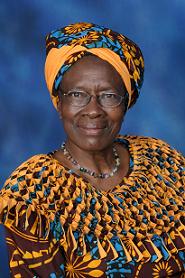The Hideyo Noguchi Africa Prize 2008 - PRESS RELEASE -
26 March 2008, Tokyo
The Government of Japan announces today its decision to award the inaugural Hideyo Noguchi Africa Prizes to Brian Greenwood and Miriam K. Were.
The laureates of each category will be awarded a citation, a medal and an honorarium of 100 million yen (approximately 1 million US dollars) at the award ceremony on 28 May 2008 within the TICAD IV.
Medical Services
 Miriam K. Were, born 1940 in Kenya; Kenyan citizen; Doctor of Public Health, Health Planning and Management 1981, Johns Hopkins University, USA; Co-founder and Health Specialist UZIMA Foundation, Kenya
Miriam K. Were, born 1940 in Kenya; Kenyan citizen; Doctor of Public Health, Health Planning and Management 1981, Johns Hopkins University, USA; Co-founder and Health Specialist UZIMA Foundation, Kenya
Community-based approach to health service
For the past 40 years, Were has dedicated her life to advancing the health and welfare of the people of Africa through a focus on the practicalities of delivering service at a local level. She has united communities to develop and implement innovative solutions to quotidian health problems. The most illustrious example of her community-based approach is her ongoing work to build public toilet facilities in local communities, improving hygiene and overcoming longstanding taboos. She also drastically raised the infant vaccination rate by organizing children into small groups to visit local clinics. Her innovation and systemic precedents have had enduring impacts not only in Kenya but throughout the East African region and across the entire continent, through her engagement with the African Union and as a key health advisor to the African Heads of State on AIDS, Tuberculosis and Malaria.
On-going battle against HIV/AIDS
Her style of work through the direct engagement of the youth, sex workers, intravenous drug users, homosexuals and others to encourage openness and frank discussion on sexuality and HIV/AIDS has galvanized communities in Kenya and contributed to the reduction of stigma and discrimination against people living with HIV/AIDS. She is a dedicated advocate for vulnerable populations, especially the poor and the marginalized. She is also committed to the empowerment and development of all voices across lines of sex, tribe, and age and class background. Widows and orphans severely affected by HIV/AIDS are amongst those most positively touched by her contribution to expanding access to medical services.

As the Chairperson of Kenya's National AIDS Control Council, Were has provided strong leadership and orchestrated a balanced HIV/AIDS response agenda that has enabled Kenya to consistently register a reduction of HIV prevalence and AIDS-related mortality. Between 2002 and 2006, HIV prevalence in Kenya was reduced from 13 percent to 5.1 percent. By 2007, the country had 150,000 people on ARV drugs compared to 2,000 in 2002. Throughout, Were has stressed the role that people living with HIV and AIDS can play in the prevention, management and socio-mitigation of the AIDS pandemic.
Harnessing and focusing the energies of NGOs
As Board-Chairperson of Africa's largest health non-governmental organization, the African Medical and Research Foundation (AMREF), Were has presided over the expansion of medical services to rural communities with an increase in Kenya's national health budget by three times between 2003 and 2007.
Were is also the co-founder and director of the UZIMA foundation, where she has used her medical expertise and wisdom to encourage and promote positive behavior amongst youth. Drug addiction among UZIMA youth participants dropped from 80 percent to below 10 percent within six months and sexual and reproductive health has shown significant improvement.
1 UZIMA Foundation is a charitable trust registered in Kenya. 'Uzima' is the Kiswahili word for 'abundant life' or 'good quality life'. UZIMA Foundation focuses on youth empowerment through improved health including control of HIV/AIDS and malaria.
